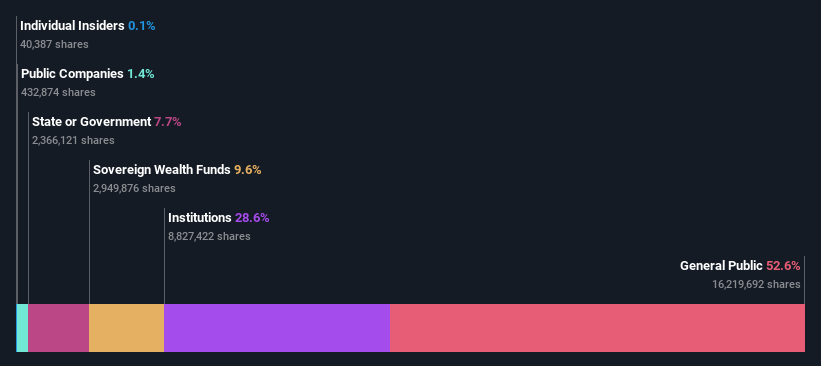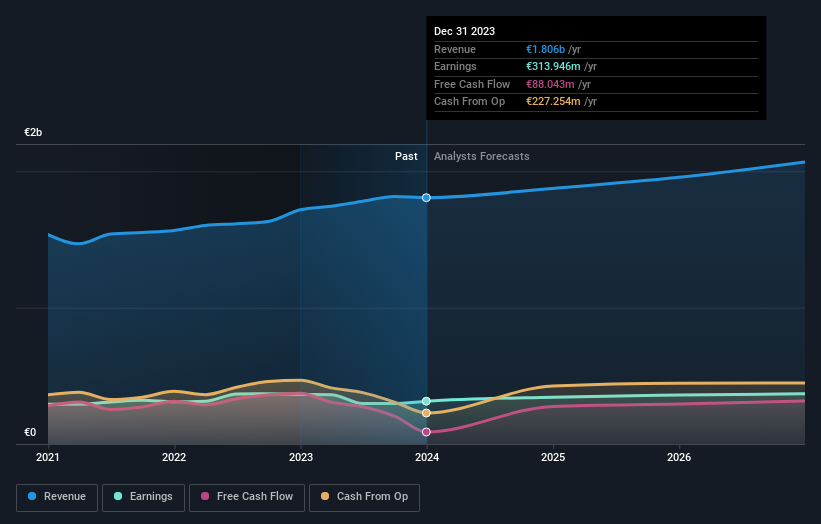Stock Analysis
Krka, d. d. (LJSE:KRKG) most popular amongst retail investors who own 53% of the shares, institutions hold 29%

Key Insights
- Krka d. d's significant retail investors ownership suggests that the key decisions are influenced by shareholders from the larger public
- The top 25 shareholders own 47% of the company
- Institutions own 29% of Krka d. d
Every investor in Krka, d. d. (LJSE:KRKG) should be aware of the most powerful shareholder groups. With 53% stake, retail investors possess the maximum shares in the company. In other words, the group stands to gain the most (or lose the most) from their investment into the company.
And institutions on the other hand have a 29% ownership in the company. Large companies usually have institutions as shareholders, and we usually see insiders owning shares in smaller companies.
Let's take a closer look to see what the different types of shareholders can tell us about Krka d. d.
Check out our latest analysis for Krka d. d

What Does The Institutional Ownership Tell Us About Krka d. d?
Many institutions measure their performance against an index that approximates the local market. So they usually pay more attention to companies that are included in major indices.
As you can see, institutional investors have a fair amount of stake in Krka d. d. This implies the analysts working for those institutions have looked at the stock and they like it. But just like anyone else, they could be wrong. When multiple institutions own a stock, there's always a risk that they are in a 'crowded trade'. When such a trade goes wrong, multiple parties may compete to sell stock fast. This risk is higher in a company without a history of growth. You can see Krka d. d's historic earnings and revenue below, but keep in mind there's always more to the story.

Hedge funds don't have many shares in Krka d. d. Kapitalska družba pokojninskega in invalidskega zavarovanja, d. d. is currently the company's largest shareholder with 11% of shares outstanding. With 9.6% and 7.7% of the shares outstanding respectively, Slovenian Sovereign Holding, d.d. and Slovenia are the second and third largest shareholders.
Our studies suggest that the top 25 shareholders collectively control less than half of the company's shares, meaning that the company's shares are widely disseminated and there is no dominant shareholder.
While studying institutional ownership for a company can add value to your research, it is also a good practice to research analyst recommendations to get a deeper understand of a stock's expected performance. There are a reasonable number of analysts covering the stock, so it might be useful to find out their aggregate view on the future.
Insider Ownership Of Krka d. d
The definition of an insider can differ slightly between different countries, but members of the board of directors always count. Management ultimately answers to the board. However, it is not uncommon for managers to be executive board members, especially if they are a founder or the CEO.
I generally consider insider ownership to be a good thing. However, on some occasions it makes it more difficult for other shareholders to hold the board accountable for decisions.
Our most recent data indicates that insiders own less than 1% of Krka, d. d.. Keep in mind that it's a big company, and the insiders own €5.0m worth of shares. The absolute value might be more important than the proportional share. Arguably, recent buying and selling is just as important to consider. You can click here to see if insiders have been buying or selling.
General Public Ownership
The general public, mostly comprising of individual investors, collectively holds 53% of Krka d. d shares. This size of ownership gives investors from the general public some collective power. They can and probably do influence decisions on executive compensation, dividend policies and proposed business acquisitions.
Next Steps:
I find it very interesting to look at who exactly owns a company. But to truly gain insight, we need to consider other information, too. Case in point: We've spotted 1 warning sign for Krka d. d you should be aware of.
If you would prefer discover what analysts are predicting in terms of future growth, do not miss this free report on analyst forecasts.
NB: Figures in this article are calculated using data from the last twelve months, which refer to the 12-month period ending on the last date of the month the financial statement is dated. This may not be consistent with full year annual report figures.
Valuation is complex, but we're helping make it simple.
Find out whether Krka d. d is potentially over or undervalued by checking out our comprehensive analysis, which includes fair value estimates, risks and warnings, dividends, insider transactions and financial health.
View the Free AnalysisHave feedback on this article? Concerned about the content? Get in touch with us directly. Alternatively, email editorial-team (at) simplywallst.com.
This article by Simply Wall St is general in nature. We provide commentary based on historical data and analyst forecasts only using an unbiased methodology and our articles are not intended to be financial advice. It does not constitute a recommendation to buy or sell any stock, and does not take account of your objectives, or your financial situation. We aim to bring you long-term focused analysis driven by fundamental data. Note that our analysis may not factor in the latest price-sensitive company announcements or qualitative material. Simply Wall St has no position in any stocks mentioned.
About LJSE:KRKG
Krka d. d
Krka, d. d., a generic pharmaceutical company, develops, produces, markets, and sells prescription pharmaceuticals, non-prescription products, and animal health products in Slovenia, South-East Europe, East Europe, Central Europe, West Europe, and internationally.
Flawless balance sheet, good value and pays a dividend.

